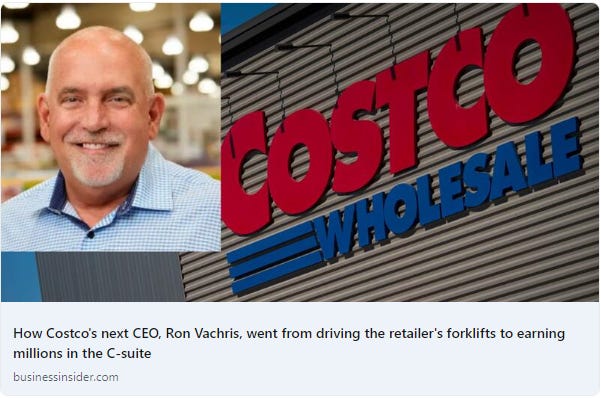Practical Experience + Business, Emotional Intelligence = Masterclass in Leadership
Familiarity with the smallest tasks often leads to success in leadership for the simple reason that it provides an intimate understanding of how the business operates at its core, from a day-to-day perspective. Starting at the top without practical, hands-on experience is seldom a recipe for success. A solid example of this in action is Costco's new CEO, Ron Vachris, who began with the company as a forklift operator 40 years ago. His rise and continued presence to the top exemplify the benefits of having leadership grounded in the practical realities of the business.
With that said, not all drivers, forklift operators, or techs have the business aptitude to be executive leaders, but it's always good to have the familiarity that helps you discern who has the values and abilities to grow and become leaders in your business. That goes both ways, if you hire a young, inexperienced tax accountant/CPA to be the COO of a transportation company with no practical experience in anything but taxes, expect the circus you adopted which means turnover of high performers, zero growth, lost contracts, etc., book intelligence doesn't always indicate the best path of success either. In my personal opinion, you need a good balance of intelligence and practical experience and often we miss one or the other in the people we hire as leaders.
💡Practical experience in the business world is akin to a masterclass in understanding the nuances, challenges, and intricacies of an organization's daily operations. It grants leaders a unique perspective that textbook knowledge doesn't provide. Here's why practical experience is invaluable:
➡Practical experience equips leaders with in-depth knowledge of the company's processes, products, and services. This firsthand understanding allows them to make informed decisions, solve problems efficiently, and identify areas for improvement.
➡Leaders with practical experience are often more relatable to employees at all levels of the organization. They can empathize with the challenges faced by frontline workers because they've been there themselves, fostering a stronger sense of camaraderie and trust within the workforce.
➡When leaders have a solid grasp of day-to-day operations, they can make quick, well-informed decisions, which is crucial in today's fast-paced business environment. This agility can be a competitive advantage in adapting to market changes and emerging trends.
➡ Executives with practical experience tend to align better with the company's culture and values. They understand the organization's history, traditions, and the factors that have contributed to its success, which enables them to preserve and strengthen those aspects.
Potential can come from people in the smallest of roles in your organization. Get familiar with your people, build rapport, and learn to discern where your potential future leaders and stars exist. Generally, their work and ambition will bubble to the top but be sure you're familiar enough to recognize when it surfaces.


